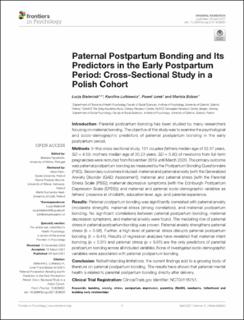Paternal Postpartum Bonding and Its Predictors in the Early Postpartum Period: Cross-Sectional Study in a Polish Cohort
Peer reviewed, Journal article
Published version
Permanent lenke
https://hdl.handle.net/11250/2979531Utgivelsesdato
2021Metadata
Vis full innførselSamlinger
Originalversjon
10.3389/fpsyg.2021.628650Sammendrag
Introduction: Parental postpartum bonding has been studied by many researchers focusing on maternal bonding. The objective of this study was to examine the psychological and socio-demographic predictors of paternal postpartum bonding in the early postpartum period. Methods: In this cross-sectional study, 131 couples (fathers median age of 32.37 years, SD = 4.59; mothers median age of 30.23 years, SD = 3.90) of newborns from full-term pregnancies were recruited from November 2019 until March 2020. The primary outcome was paternal postpartum bonding as measured by the Postpartum Bonding Questionnaire (PBQ). Secondary outcomes included: maternal and paternal anxiety [with the Generalized Anxiety Disorder (GAD) Assessment]; maternal and paternal stress [with the Parental Stress Scale (PSS)]; maternal depressive symptoms [with the Edinburgh Postpartum Depression Scale (EPDS)]; and maternal and paternal socio-demographic variables as fathers’ presence at childbirth, education level, age, and parental experience. Results: Paternal postpartum bonding was significantly correlated with paternal anxiety (moderate strength), maternal stress (strong correlation), and maternal postpartum bonding. No significant correlations between paternal postpartum bonding, maternal depression symptoms, and maternal anxiety were found. The mediating role of paternal stress in paternal postpartum bonding was proven. Paternal anxiety strengthens paternal stress (b = 0.98). Further, a high level of paternal stress disrupts paternal postpartum bonding (b = 0.41). Results of regression analyses have revelated that maternal infant bonding (p < 0.01) and paternal stress (p < 0.01) are the only predictors of parental postpartum bonding across all included variables. None of investigated socio-demographic variables were associated with paternal postpartum bonding. Conclusion: Notwithstanding limitations, the current findings add to a growing body of literature on paternal postpartum bonding. The results have shown that paternal mental health is related to parental postpartum bonding directly after delivery.

